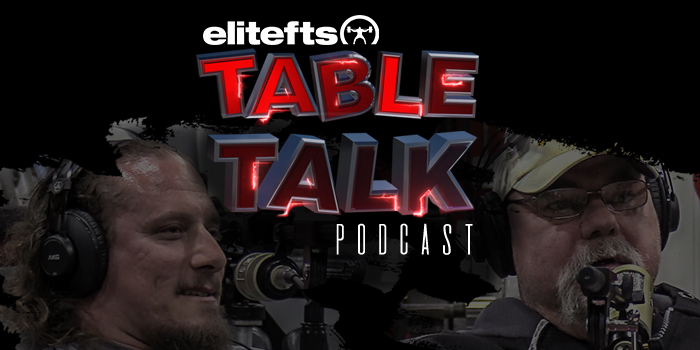
The first question Dave Tate brings to the first Table Talk Podcast (featuring guests Dan Green and Andrew Herbert) is one from an Instagram DM:
"How do I get stronger at 41 years old?"
Dan has trained people of all different ages, and he says that no matter the age, the training has to have the same system. The trick is doing just enough to make progress but not doing too much so you can’t sustain it.
That “trick” applies to everything: challenging your Central Nervous System, volume, building up lifting capacity, and doing enough isolated lifts... it’s a scale.
Dave says it’s a tricky thing:
"Whenever I see a question like that, the first thing that goes through my head is 'When did you start?' At 41 years old, if you started competing when you were 13, you’ve got a lot of wear and tear in you. If you started when you were 35, all-time World Records have been broken by people who are 45 years old."
It goes without saying (though Dave says it here) that age will have a detrimental effect, but that’s life, but he doesn’t think 40 is the tipping point.
Andrew has gotten that question in-person, and his response is something along the lines of:
"Strength and muscularity is kind of the last physical capacity to go. I think things like agility, reaction time, are the first things to go when you see tennis players and gymnasts peak at 20. But you’ve seen the last Mr. Olympia, Shawn Rhoden, was 43 years old. Stan Efferding was breaking records into his mid-40s."
According to Dave, there’s a number to throw out there, and he says it’s in the 50s. He started competing when he was 13 — common powerlifting injuries aside — he didn’t start falling apart until he was 45. Keep in mind that takes into account that he powerlifted with no breaks. And for him, that wear and tear became joint issues.
From a long-term powerlifter’s perspective, everyone’s sort of looking down that tunnel, especially if there’s a genetic predisposition to these issues. Then it’s only a matter of when.
Still, 41 is a far cry away from being the end of a powerlifting career. Dave talks about Louie Simmons, who squatted 920 at 52 years old. Dave can’t quite wrap his mind around that. Granted, Dave’s not 52, but he has titanium hips and can’t move his arm, but... how did Louie do that?
Dan brings up the example of Jennifer Thompson, who is in her early 40s, and she’s the best female lifter in the world, and it’s not slowing her down.
The biggest takeaway from this, at least if you ask Dave, is that it’s important to be self-aware, especially if you’re a younger lifter. The earlier you learn that, the better. Don’t do stupid shit. Dave learned it the hard way, and it cost him later on.
Sure, there are people like Ed Coan who stick to a regimented program, but Dan points out that’ll still add up wear and tear over time.
As he’s gotten older, Dave’s also realized that such a program requires more discipline and more hardcore than “going fucking apeshit” in the gym — and that is so hard to do!
Andrew agrees:
It’s walking a tightrope, basically, and that’s something I’m trying to learn myself. A thing I tell people also, one of my favorite sayings in life is, 'The perfect is the enemy of the good.' If you’re striving to have the perfect workout, you’re always going to fail. If you’re trying to have a good workout, that’s a reasonable goal and expectation. I think just too many people get the 'paralysis by analysis,' and especially if they think, 'Oh, I’m 41, I have to do everything perfect,' well, then you’re not even gonna start."
Dan poses the question, “What is the perfect workout?” Does it mean if you have a perfect workout today, then you’ve ensured you’re going to make your PRs at a meet that’s coming up in six weeks?
He thinks it’s better to get many good workouts strung together, as that’s more likely to help you hit those PRs. It’s what Dan calls “Training ADD,” where if you feel good one day, you might try to max out and kill it, but it’s not going to work every single time. At some point doing that too much is setting you back.
It’s really all about balancing on that tightrope.










